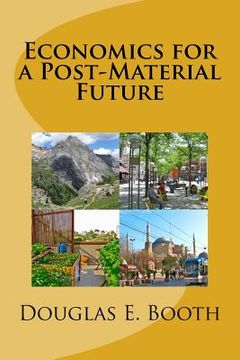Share
Economics for a Post-Material Future (in English)
Douglas E. Booth
(Author)
·
Createspace Independent Publishing Platform
· Paperback
Economics for a Post-Material Future (in English) - Booth, Douglas E.
$ 7.16
$ 8.95
You save: $ 1.79
Choose the list to add your product or create one New List
✓ Product added successfully to the Wishlist.
Go to My WishlistsIt will be shipped from our warehouse between
Tuesday, June 04 and
Wednesday, June 05.
You will receive it anywhere in United States between 1 and 3 business days after shipment.
Synopsis "Economics for a Post-Material Future (in English)"
When asked, most people could say something about their personal philosophy-those beliefs and values that guide them on their path through life. In their theorizing and empirical work, economists normally assume that we humans make choices in the world for the purpose of maximizing our well-being. The philosophies behind our choices rarely get much traction in economic research beyond the idea of maximization itself. This I believe to be mistaken. Beliefs and values indeed influence the choices we make, economic and otherwise. My contention in the pages ahead is that shifts in personal philosophies matter and can fundamentally alter economic arrangements and outcomes. We may seek to maximize our well being, but our notion of what this means shifts with time and circumstances. What's of importance to us today may not be so tomorrow. To make my point in this book, I will describe a fundamental value shift underway globally and explore actual and potential economic changes flowing from it. This shift amounts to a weakening of an orientation to simple economic materialism and a strengthening of interest in more complex qualitative accomplishments and experiences that don't always require an expansion in private possessions. For economic materialists, the essential human purpose is the accumulation of material possessions even if basic biological survival is well assured. Economic materialists see the gaining of power, pleasure, status, social intercourse, creative accomplishment, and spirituality as heavily dependent on what one owns and privately consumes. Life is all about possessing and consuming, and little else. For post-materialists, access to material goods matters but is secondary to a life of meaning defined by a value-driven personal philosophy. The essential difference between materialism and post-materialism is one of emphasis. In the first case, the human psyche focuses on acquiring material possessions, and in the second it shifts to concern with not only the experiences of life but also the realization of an array of human values as the final source of meaning. In this shift we move further away from a basic quantitative and biological orientation to the satisfaction of physical needs and toward a qualitative satisfaction of wants for mental experiences. We in effect move from dwelling almost entirely on the material hardware of life to an expanded interest in its qualitative software. My essential purpose in this book is to review the evidence for a post-materialist value trend and to then establish and explain the economic changes flowing from it. My basic conclusion will be that personal philosophical outlooks have economic consequences. The future economy in a post-material world will feature such changes as these: more flexible working hours and shorter workweeks; a return to downtown living; an expanded clean energy sector and greenhouse gas emissions reductions; a substantial shift from acquisition of material possessions to more shared experiences and a rising demand for shared public goods; an activist fiscal policy to sustain employment in the face of weakening private sector consumption; and more expansive economic democracy and employee ownership. This vision looks like a political liberal's dream and a political conservative's worse nightmare. I could easily be wrong about its realization, but let me explain to you in this book why I think I am right. Then you can judge.
- 0% (0)
- 0% (0)
- 0% (0)
- 0% (0)
- 0% (0)
All books in our catalog are Original.
The book is written in English.
The binding of this edition is Paperback.
✓ Producto agregado correctamente al carro, Ir a Pagar.

